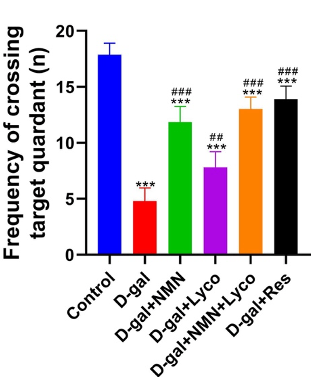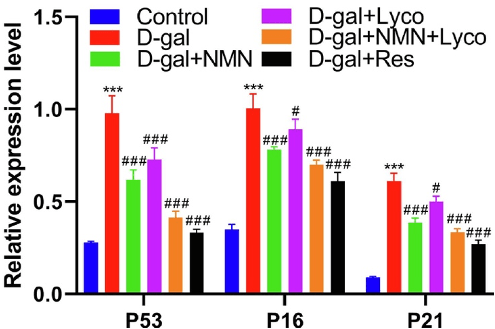Researchers in China show that the NAD+ precursor NMN and antioxidant resveratrol boosts the cognition of aged rats by their senolytic action.
By Victor Ciardha www.nmn.com
Highlights:
The antioxidant craze over the last decades was based on the idea that free radicals cause damage to our cells, leading to disease. A lack of positive results from human studies caused the craze to wane. However, when it comes to aging, antioxidants may only be one piece of the puzzle. The aging research now suggests that several highly interrelated processes, including free radicals, contribute to the organ and tissue damage that ultimately leads to age-related disease. Now scientists are trying to find ways of targeting this multitude of processes with combination therapies.
Researchers from Xinjiang Agricultural Technical College in China report in Gene that the combination of nicotinamide mononucleotide (NMN) and lycopene prevent cognitive impairment in aged rodents. They show that NMN, an intermediate of nicotinamide adenine dinucleotide (NAD+), can improve the memory and learning of aged rats while eliminating senescent cells.
“It is widely accepted that the level of cellular NAD+ is essential for normal cellular proliferation and function, regulation of mitochondrial metabolism, as well as the normal activation of anti-aging pathways,” said the authors.
Liu and colleagues also show that two phytochemicals (plant chemicals), resvertrol and lycopene, have similar cognitive boosting and senolytic effects.
NMN and Antioxidants Boosts Cognition by Targeting Hallmarks of Aging
To study aging in rodents, researchers commonly use a sugar called D-galactose (D-gal). When injected into animals, D-gal causes the excessive accumulation of reactive oxygen species (ROS), a type of free radical. In turn, ROS cause damage to cells and organs, a process called oxidative stress. Liu and colleagues injected young rats with D-gal to induce premature aging.
To evaluate the effect of NMN, resveratrol, and lycopene on the spatial learning and memory of aged (D-gal) rats, the Chinese researchers conducted a commonly used test called the Morris water maze. It was shown that the memory and learning performance of aged rats was worse than young rats, demonstrating deficits in cognition. Injecting the aged rats with 100 mg/kg of NMN, 50 mg/kg of resveratrol, or 50 mg/kg of lycopene countered these deficits.

(Liu et al., 2022 | Gene) NMN, Lycopene, and Resveratrol Restore Age-Related Cognitive Deficits. Injecting aged mice with NMN, lycopene, resveratrol, or NMN + lycopene increases the number of target quadrant crossings, suggesting improved spatial learning and memory. * = different than control. # = different than D-gal.
There are several interrelated processes that are thought to underly the aging process and are considered hallmarks of aging. One of these processes is the accumulation of senescent cells. Senescent cells cause damage to tissue by promoting inflammation, another hallmark of aging. Senolytics — compounds that eliminate senescent cells — have become prominent in the aging field because they target senescent cells. Similar to boosting cognition, Liu and colleagues showed that NMN, resveratrol, and lycopene remove senescent cells from aged rat brains.

(Liu et al., 2022 | Gene) NMN, Lycopene, and Resveratrol Reduce Brain Senescence. Genes used to identify senescent cells (p53, p16, p21) were increased in aged mice (D-gal) but reduced by NMN, lycopene, resveratrol, or NMN and lycopene.
Countering Aging & Senescence via Different Routes
Overall, the findings of Liu and colleagues suggest that NMN, resveratrol, and lycopene can improve the memory and learning of aged rats by eliminating senescent cells. While resveratrol may be beneficial for treating symptoms in Alzhiemer’s disease patients, the effect of NMN and lycopene on cognition and dementia have yet to be tested on humans.
Like resveratrol, lycopene is a potent antioxidant, meaning that it neutralizes ROS to alleviate oxidative stress. Lycopene has previously been shown to improve cognitive impairments in aged mice and rodent models for Alzheimer’s disease by itself and in combination with cell therapy. The NAD+ precursor, NMN has been shown to improve cognitive impairment alone and in combination with melatonin in aged rats. Like lycopene and resveratrol, NMN also improves cognition in Alzheimer’s rodents.
While NMN reduces oxidative stress, it does not directly neutralize ROS like resveratrol and lycopene, but increases NAD+ levels. NAD+ is important for many essential cellular processes, including energy metabolism and mitochondrial function, the dysfunction of which are hallmarks of aging. Thus, Liu and colleagues demonstrate that the same age-related conditions, like cognitive decline, can be alleviated by targeting one aging process (senescence) through two separate but interrelated aging processes (oxidative stress and mitochondrial dysfunction).
Model and Dosage
Model: male Sprague-Dawley rats aged by D-gal
Dose: injection (intraperitoneal) of 100 mg/kg of NMN and/or injection of (intragastric) of 50 mg/kg of lycopene
Story Source
Liu X, Dilxat T, Shi Q, Qiu T, Lin J. The combination of nicotinamide mononucleotide and lycopene prevents cognitive impairment and attenuates oxidative damage in D-galactose induced aging models via Keap1-Nrf2 signaling. Gene. 2022 May 15;822:146348. doi: 10.1016/j.gene.2022.146348. Epub 2022 Feb 17. PMID: 35183682.Mode
Journal Reference
Nunez J. Morris Water Maze Experiment. J Vis Exp. 2008 Sep 24;(19):897. doi: 10.3791/897. PMID: 19066539; PMCID: PMC2872979.
Tosatti JAG, Fontes AFDS, Caramelli P, Gomes KB. Effects of Resveratrol Supplementation on the Cognitive Function of Patients with Alzheimer’s Disease: A Systematic Review of Randomized Controlled Trials. Drugs Aging. 2022 Apr;39(4):285-295. doi: 10.1007/s40266-022-00923-4. Epub 2022 Feb 21. PMID: 35187615.
López-Otín C, Blasco MA, Partridge L, Serrano M, Kroemer G. The hallmarks of aging. Cell. 2013 Jun 6;153(6):1194-217. doi: 10.1016/j.cell.2013.05.039. PMID: 23746838; PMCID: PMC3836174.
Zhao B, Liu H, Wang J, Liu P, Tan X, Ren B, Liu Z, Liu X. Lycopene Supplementation Attenuates Oxidative Stress, Neuroinflammation, and Cognitive Impairment in Aged CD-1 Mice. J Agric Food Chem. 2018 Mar 28;66(12):3127-3136. doi: 10.1021/acs.jafc.7b05770. Epub 2018 Mar 15. PMID: 29509007.
Ning WJ, Lv RJ, Xu N, Hou XY, Shen C, Guo YL, Fan ZY, Cao N, Liu XP. Lycopene-Loaded Microemulsion Regulates Neurogenesis in Rats with Aβ-Induced Alzheimer’s Disease Rats Based on the Wnt/β-catenin Pathway. Neural Plast. 2021 Sep 6;2021:5519330. doi: 10.1155/2021/5519330. PMID: 34545285; PMCID: PMC8448994.
Xu Z, Liu C, Wang R, Gao X, Hao C, Liu C. A combination of lycopene and human amniotic epithelial cells can ameliorate cognitive deficits and suppress neuroinflammatory signaling by choroid plexus in Alzheimer’s disease rat. J Nutr Biochem. 2021 Feb;88:108558. doi: 10.1016/j.jnutbio.2020.108558. Epub 2020 Nov 26. PMID: 33249184.